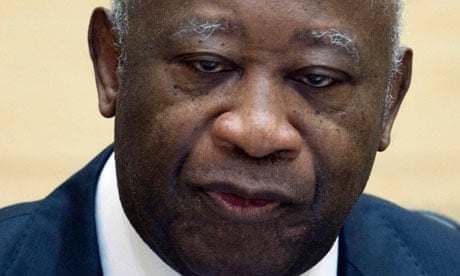His shirt was pressed white, his tie straight, his suit sharp and his demeanour calm yet defiant. It was quite a makeover from the sweaty white vest and bewildered expression that spoke of a man stripped of power and dignity when the eyes of the world were last upon him.
Laurent Gbagbo, the former president of Ivory Coast, seemed intent on playing the global statesman rather than the fugitive from justice when he appeared at the international criminal court at The Hague on Monday.
The ICC has previously tried and failed to bring the might of international law down on Sudan's president, Omar al-Bashir, and Libya's late leader Muammar Gaddafi. The latter would have been unrivalled as legal theatre, but it was Gbagbo who faced the dishonour of becoming the first former head of state to stand trial at the world's premier war crimes court.
Evidently unmoved by this piece of geopolitical history, the 66-year-old quibbled over how his name had been set down by the court and complained about the manner of his extradition.
Gbagbo was transferred to the Netherlands last week to face four charges of crimes against humanity. His supporters are alleged to have committed murder and rape as he rejected Ivory Coast's election result and tried to cling to his decade-long rule.
Prosecutors say about 3,000 people died in four months of violence perpetrated by both sides after Gbagbo refused to concede. President Alassane Ouattara took power in April, with the help of French and UN forces, after a dishevelled Gbagbo was plucked from his bunker.
Looking healthier and more rested than on that occasion, Gbagbo smiled at supporters in the public gallery as the 25-minute hearing opened. "Good afternoon madame president, thank you for letting me speak," he said, "I am Laurent Gbagbo."
He told three-judge panel he did not need them to read the charges. Speaking in French, Gbagbo said he wanted to see the evidence against him: "I will challenge that evidence and then you hand down your judgment."
He blamed France, the former colonial power in Ivory Coast, for his arrest by pro-Ouattara forces: "I was arrested under French bombs. It was the French army that did the job." He said he saw his son beaten and his interior minister killed in the fighting. "I was the president of the republic and the residence of the president of the republic was shelled." He also complained about his transfer to The Hague last week from northern Ivory Coast where he was under house arrest.
"We were deceived," he said, adding that the official in charge of his transfer "did not have the courage to tell me I was going to The Hague" until after he was at the airport. Monday's brief hearing was to confirm Gbagbo's identity and ensure he understood his rights and the charges.
According to court papers, he is charged as an "indirect perpetrator" in a carefully orchestrated campaign of violence against Ouattara supporters. The presiding judge, Silvia Fernández de Gurmendi, of Argentina, scheduled a hearing for 18 June when prosecutors will present a summary of evidence and judges will decide whether it is strong enough to merit bringing Gbagbo's case to trial.
Before that, judges will schedule conferences to discuss progress in the case, during which Gbagbo can challenge his detention. and seek release pending further hearings.
He said conditions at the detention centre where he has been held are "fine". Inmates have single cells of about 10 square metres where they can watch TV, read or work on their cases using computers but cannot access email or the internet. Each cell contains a bed, desk, bookshelves, a cupboard, toilet, hand basin and a telephone, although calls are placed by the centre's staff. Gbagbo's lawyers have condemned his arrest and transfer to the court.
"It's a neocolonialist trial," his adviser Toussaint Alain told reporters in The Hague. "The [ICC] has become an instrument of France … to empower friends and punish the ones who don't follow along.
"The presence of president Laurent Gbagbo in the dock is clearly a judicial error, a swindle, a move to liquidate him politically, socially and physically."
Gbagbo's lawyer Habiba Toure also challenged the legitimacy of his detention last week on an ICC warrant while he was under house arrest.
"In principle, an arrest warrant is delivered to a free individual or a person on the run, which was not the case for Mr Gbagbo because he was already in the hands of Ivory Coast officials," Toure said.
A handful of supporters outside court condemned France's role in removing him from power. Abel Naki, who travelled from Paris to be at the court, told the Associated Press: "This is a masquerade by the French president, Nicolas Sarkozy. Sarkozy orchestrated this coup d'etat."
But Charles Ble Goude, leader of the youth wing of Gbagbo's party, said the ICC was the ideal stage to undermine Ouattara's credibility.
"The truth comes out now, with Laurent Gbagbo holding the floor Monday and for the coming months," he said in an open letter released on Sunday.
The protesters' anger hinted at lingering tensions between Gbagbo and Ouattara supporters in Ivory Coast that the ICC will not necessarily heal.
Human rights groups say grave abuses, including executions and rapes, were also were committed by forces loyal to Ouattara, who enlisted the help of a former rebel group to sweep south and force Gbagbo from office.
The ICC's chief prosecutor, Luis Moreno-Ocampo, said last week that both sides of the political divide in Ivory Coast committed crimes in the post-election chaos and that his investigation was continuing.
Gbagbo is the sixth suspect taken into custody by the court, which has launched seven investigations, all of them in Africa. A further 12 suspects remain at large and the court has no police force to arrest them.
